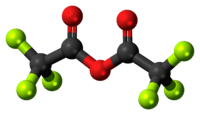Trifluoroacetic anhydride
From Wikipedia, the free encyclopedia
| Trifluoroacetic anhydride | ||
|---|---|---|
 | ||
 | ||
| IUPAC name trifluoroacetic anhydride | ||
| Identifiers | ||
| CAS number | 407-25-0 | |
| PubChem | 9845 | |
| Jmol-3D images | Image 1 | |
| ||
| Properties | ||
| Molecular formula | C4F6O3 | |
| Molar mass | 210.03 g mol−1 | |
| Density | 1.487 g/mL | |
| Melting point | −65 °C; −85 °F; 208 K | |
| Boiling point | 40 °C; 104 °F; 313 K | |
| Hazards | ||
| MSDS | Oxford MSDS | |
| EU classification | Harmful (Xn); Corrosive (C) | |
| Except where noted otherwise, data are given for materials in their standard state (at 25 °C (77 °F), 100 kPa) | ||
| Infobox references | ||
Trifluoroacetic anhydride (TFAA) is the acid anhydride of trifluoroacetic acid. In particular, trifluoroacetic anhydride is the perfluorinated derivative of acetic anhydride. Like many acid anhydrides, it may be used to introduce the corresponding trifluoroacetyl group. The corresponding trifluoroacetyl chloride, is a gas, making it inconvenient to work with. Trifluoroacetic anhydride is the recommended desiccant for trifluoroacetic acid.[1]
Preparation
Trifluoroacetic anhydride may be prepared from trifluoroacetic acid by dehydrating with excess α-halogenated acid chlorides. For example, with dichloroacetyl chloride:[2]
- 2 CF3COOH + Cl2CHCOCl → (CF3CO)2O + Cl2CHCOOH + HCl
References
- ↑ Chai, Christina Li Lin; Armarego, W. L. F. (2003). Purification of laboratory chemicals (Google Books excerpt). Oxford: Butterworth-Heinemann. p. 376. ISBN 0-7506-7571-3.
- ↑ US 4595541
This article is issued from Wikipedia. The text is available under the Creative Commons Attribution/Share Alike; additional terms may apply for the media files.